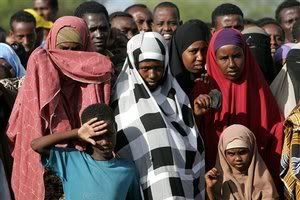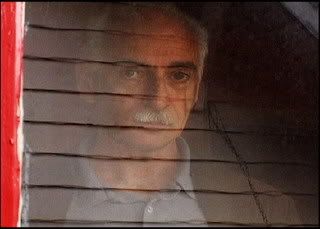Kenya has shut its border with Somalia and will not allow more refugees into the country, says its foreign minister.
Earlier the
Kenyan authorities deported more than 420 Somali refugees who had crossed the border in recent days.
The
UN refugee agency has condemned Kenya's actions, with aid workers expressing frustration at being unable to help
Somalis fleeing conflict.
There have been clashes near the Kenyan border with Islamist militias being pursued by Ethiopian and Somali troops.
Kenya has deployed tanks and helicopters to enforce the border closure.
The recent advance of heavily armed
Ethiopian troops has ended a six-month
Islamist occupation which had brought a degree of stability to large areas of formerly lawless
Somalia.
But the
Islamists say their retreat is tactical and have threatened to launch an insurgency.
RefugeesKenyan Foreign Minister Raphael Tuju told reporters in the Kenyan capital,
Nairobi, that they have now asked the transitional government and
Ethiopia to establish internally displaced people camps in
Somalia.
"We are not able to ascertain whether these people are genuine refugees or fighters and therefore its best that they remain in Somalia," said
Mr Tuju.
Mr Tuju also dismissed
UNHCR criticism as misguided.
"Kenyans are overburdened, in fact Europe and America does not give us enough aid to support these refugees and it's not a written rule that when there is fighting in Somalia that people should run to Kenya, other nations should also take the burden," he said.
The
Somali refugees, mainly women and children, were deported after being taken from the border transit camp at
Liboi in
north-east Kenya in government trucks.
Earlier,
UNHCR spokesperson
Millicent Mutuli said the
Kenyan Red Cross had been denied access to them for four days.
"It's against international law to deny people access to humanitarian assistance under such circumstances," said
Ms Mutuli.
UNHCR head
Antonio Guterres said deserving
Somali civilians should be entitled to seek asylum in
Kenya.
PursuitMeanwhile,
Ethiopia and
Somali government forces, with air support, have captured the Somali border town of
Doble, where it is reported that around 4,000 refugees have been stranded.
The
BBC's Bashkash Jugsodaay in
Liboi says that the
Islamist militia who formerly held
Doble fled late on Tuesday night in about 100 technicals - machinegun-mounted pick-up trucks - carrying an estimated 600 to 700 fighters.
The Somali interim government's spokesman
Ali Jama told AFP news agency that their forces were in pursuit of top Islamist leaders in dense border terrain.
"We are yet to pin-point where they are, but we believe they are hiding in the border forest," he said.
TalksAfter European members of the
Somali Contact group met in
Brussels,
Swedish Foreign Minister Carl Bildt called for peace talks.
"There has to be a withdrawal of the
Ethiopian forces. There has to be a political process, an inclusive political process in
Somalia."
The
European Union is the largest aid donor to
Somalia and has been heavily involved in the mediation process.
Somalia's interim
President Abdullahi Yusuf is in
Nairobi for talks with diplomats, while
Ugandan President Yoweri Museveni is to travel to Ethiopia on Thursday to discuss the possible deployment of
Ugandan troops to
Somalia.
Uganda is the only country to have made a firm commitment - of up to 1,000 soldiers - towards a planned African peacekeeping force for
Somalia.
A deadline of Thursday has been set for
Somalis in the capital to hand in their weapons, but the process has begun slowly.

